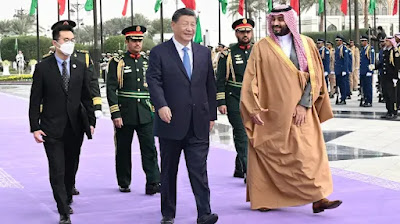 |
| China and Saudi Arabia strengthen partnership in energy and defense |
Beijing and Riyadh say they will "firmly support each other's core interests" during President Xi Jinping's state visit to the kingdom.
Saudi Arabia and China reaffirmed their principle of non-interference in the global oil market and internal affairs during a visit aimed at deepening strategic ties at a time when Washington's relationship with Riyadh appears to be increasingly strained. Cooperation has been reiterated.
Chinese President Xi Jinping and Saudi King Salman have signed a number of strategic agreements since the start of their state visit on Wednesday, including one with Chinese tech giant Huawei.
In a joint statement on Friday, the two sides said they "exchanged views on ways to strengthen and promote the comprehensive strategic partnership between the country and China".
He stressed the principles of sovereignty and "non-intervention", while affirming the importance of a peaceful resolution of the Ukraine conflict.
Acknowledging Gulf security concerns over Iran, another oil supplier to China and with which Beijing has good relations, he called for "strengthening joint cooperation to ensure the peaceful nature of Iran's nuclear program." Agreed on the need to "make", and respect for Tehran "principles of good neighborliness".
The Chinese leader said his visit, during which he will meet with other Gulf oil producers and attend a wide-ranging summit with Arab League nations on Friday, marked a "new stage" in relations. era" began.
"China looks forward to working with Saudi Arabia and the Arab states to make the two summits a milestone in the history of China-Arab relations and China-GCC relations," the Chinese Foreign Ministry quoted Xi Jinping as saying. events and take these relations to new heights." .
The Emir of Qatar, the Crown Prince of Kuwait, and the presidents of Egypt, Tunisia, Djibouti, Somalia, and Mauritania are among the rulers attending, along with the leaders and prime ministers of Iraq, Morocco, Algeria, Sudan, and Lebanon.
'Internal Affairs of the State'
Riyadh reiterated its adherence to the "one China principle", which states that the People's Republic of China (PRC) is the sole legal government and that Taiwan is an inalienable part of Chinese territory.
China is determined to block Taiwan's independence and annex the island to the mainland. Western governments, including the United States, recognize the PRC as the sole legal government of China, but also maintain unofficial relations with Taiwan.
In return, Beijing reiterated its opposition to "any move that interferes in the internal affairs of the Kingdom of Saudi Arabia".
Both sides stressed the importance of stability in global oil markets, and agreed to explore investment opportunities in the petrochemical sector as well as renewable energy sources, the statement said.
China is the largest importer of crude oil in the world, for which it is heavily dependent on Saudi Arabia.
He also welcomed the involvement of Saudi companies in various energy and investment partnerships within the framework of the Belt and Road Initiative, a massive infrastructure project that will stretch from East Asia to Europe that will be "a hub for Chinese companies." therefore enhances the state's position as a regional center.
Deep relationships
Beijing has been strengthening ties with Gulf states over the past few years, but its foreign ministry called Xi's visit this week "the biggest diplomatic activity between China and the Arab world" since the PRC was founded.
Saudi Crown Prince Mohammed bin Salman (MBS) is eyeing the world's second-largest economy as a key partner in his sweeping Vision 2030 agenda and ambitious mega-projects, including the future $500 billion mega-city, Nyum.
The Saudis are pushing to diversify their economic and political alliances at a time when relations with their long-time US allies appear strained by differences.
US President Joe Biden visited Saudi Arabia in July to convince the Saudis to increase oil production and lower gas prices at the pump, despite criticism from lawmakers in Washington over human rights concerns.
Saudi-led OPEC+ agreed in October to cut oil production by 2 million barrels, which the Biden administration saw as a direct affront ahead of the 2022 midterm elections.
Saudi Arabia and its Gulf allies have resisted U.S. pressure to break with fellow OPEC+ oil producer Russia over an attack on Ukraine and limit trade with China, as they watch national economies for a polarized world order. Try to navigate. Security interests.







